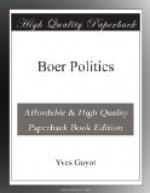The position assumed by the English Government was a very simple one; it had declined to interfere to a large degree, and it desired to interfere still less, in the disputes between the Uitlanders and Boers. It was of opinion that the only way of putting an end to them was the granting of the franchise, so as to enable them to attend to their own interests. The English Government, far from desiring to increase its intervention in the actions of the Transvaal Government, desired to say to the Uitlanders: “You have your electoral rights; make use of them in your own defence.”
As was easy to foresee, President Krueger, in accordance with his custom began on a number of side issues, instead of going straight to the point, thus employing the method, known to most of us who have had dealings with mistrustful and ignorant peasants. He raised among others the following questions: (1) Swaziland, which he wanted to annex; (2) The mobilisation of the army; (3) The payment of the Jameson Raid indemnity (of which we will speak later); (4) The Uitlanders’ petition; (5) The Gold law; (6) The Mining law; (7) The Liquor law; (8) The Tariff law; (9) The Independence of the Republic; (10) The Dynamite Monopoly; (11) Arbitration on all disputed points; (12) British intervention in the internal policy of the South African Republic. And then, added Mr. Krueger ingeniously, when all these matters have been disposed of, we can take up the question of Franchise.
At the very first sitting Sir Alfred Milner declined to enter upon those subjects; at the second sitting he proposed the following conditions for the Franchise; (a) A five years’ residence; (b) Declaration of intention to settle in the Transvaal; (c) Oath to obey the laws, and to fulfil all the obligations of citizenship, military service included; (d) The Franchise to be accorded only to men of good repute, holders of a given amount of property or of a given income; (e) a certain number of seats to be reserved in the Volksraad for districts where Uitlanders were in the majority.
After keenly contesting these points, Mr. Krueger gave renewed proof of his ‘intellectual superiority’ by advancing counter proposals bristling with conditions such as sorcerers exact to enable them to accomplish their miracles. As there is always at least one impossible of realisation, the dupe is always in the wrong; in the same manner, it was Krueger’s aim to be able to say to the Uitlanders, who did not obtain the Franchise: “It is your own fault. You have not carried out the conditions!”
Oh! Mr. Krueger showed again at Bloemfontein how very clever he is, and how worthy of Bismarck’s admiration—but, Bismarck only entered upon a policy which he could carry through.
According to Krueger’s proposal, every new-comer must within a fortnight of arrival have himself inscribed as a candidate for naturalisation and the Franchise; the former would be granted after two years; the latter after five more years; seven years in all. But should the first formality have been neglected within the stated time, the Uitlander was to forfeit for good and all the right of obtaining either the one or the other! The first condition having been fulfilled, the inscribed Uitlander was to prove “his obedience to the laws”; but President Krueger did not signify how he was to give this negative proof.




